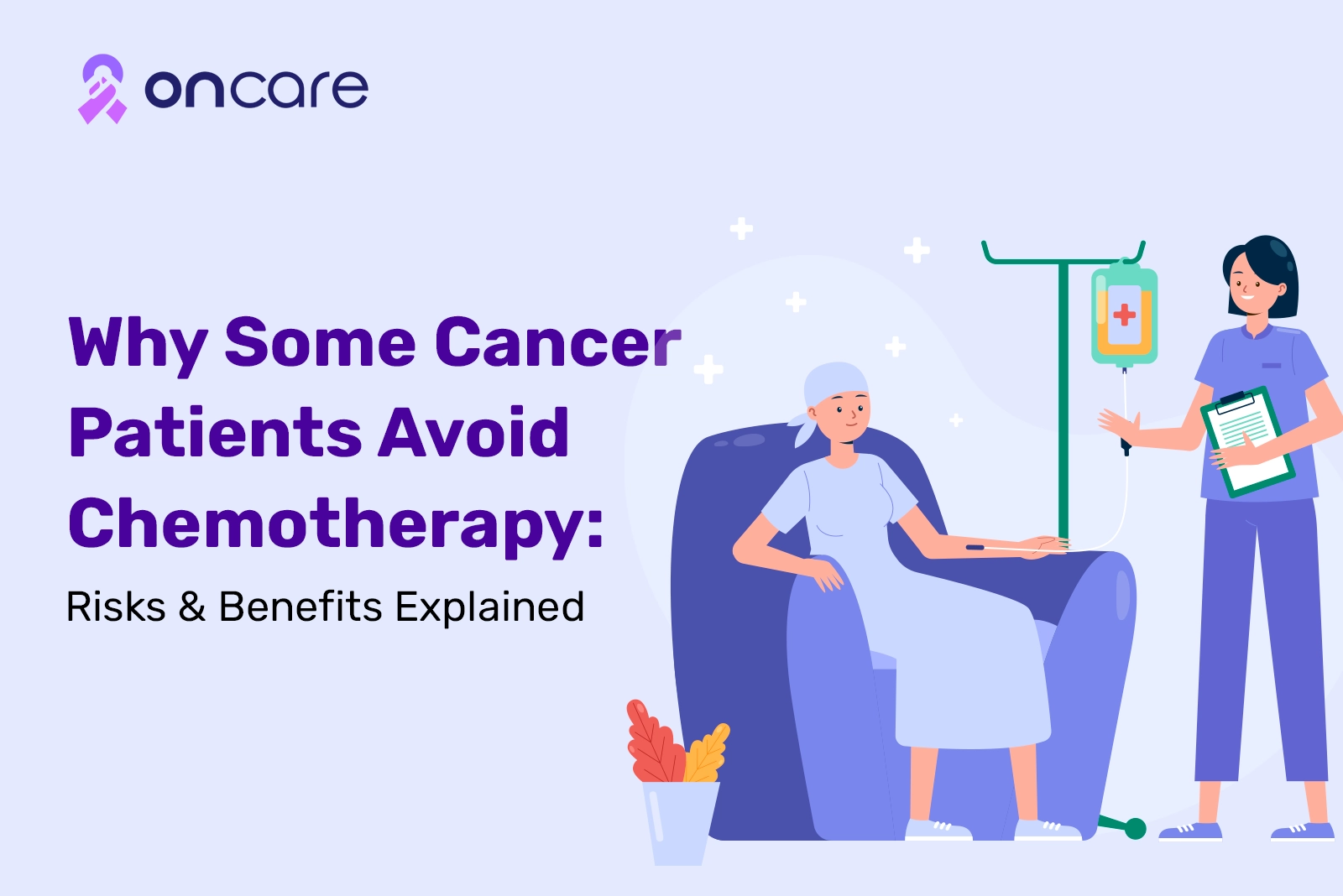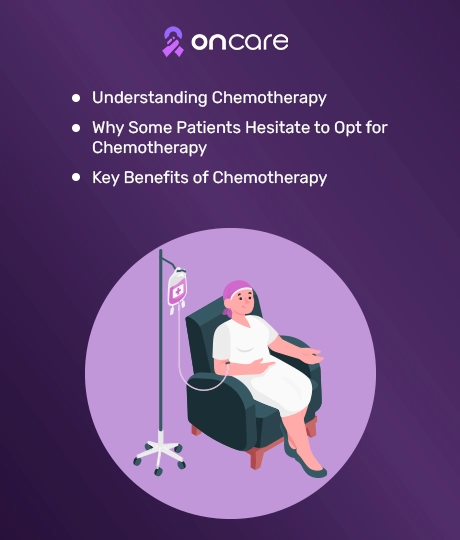Why Some Cancer Patients Avoid Chemotherapy: Risks & Benefits Explained

With a cancer diagnosis, life can be pretty frightening, and deciding on whether to receive cancer chemotherapy may be one of the most pressing decisions you will face during it. Chemotherapy has been the chief form of treatment for cancer for many decades, though there are still some patients reluctant to do so for fear of side effects or false notions of its effectiveness.
At Oncare, understanding these concerns and guiding the patients to embrace this treatment with warmth and expertise is our objective. In this article, we will analyze some patients' reluctance to opt for chemotherapy, their associated risks, and the life-saving benefits associated with this treatment.
Understanding Chemotherapy
Chemotherapy, in simple terms describes a system whereby various drugs are employed to kill those parts of the body affected by cancer. It relies on the ability of these drugs to damage DNA, inhibit the enzymatic process of cell division, or interfere with the formation of microtubules in mitosis. Generally, these drugs target fast-growing cancer cells. Side effects, however, may occur because some normal cells also are affected by it. Fortunately, the precision and tolerability of chemotherapy have been greatly enhanced by developments in drug delivery, combination therapies, and supportive care, making it a basic component of contemporary cancer treatment.

Why Some Patients Hesitate to Opt for Chemotherapy
Of course, any person who is about to undergo chemotherapy cannot help but feel anxious, especially with prior knowledge of the possible side effects from most discussions. With adequate support and the right interventions, many of these risks could be actually well kept at bay.
Temporary Side Effects
Chemotherapy most often leads to causes of fatigue, nausea, vomiting, and hair loss due to the spillover effect of rapidly dividing cells, including the healthy ones.
- Fatigue: It is one of the common reactions and is mostly transient. Some light exercises such as walking or yoga may hike up energy levels. Nutritional support in the form of iron-rich foods or supplements may also help with fatigue.
- Nausea and vomiting: Nowadays, very effective drugs against nausea and vomiting belong to the class of either NK1 receptor antagonists or the class of 5-HT3 receptor blockers. Drugs of this class are administered both, before and after, chemotherapy cycles.
- Hair loss (Alopecia): Scalp cooling systems like cold caps reduce hair loss by constricting the blood flow to the scalp, which then limits the chemotherapy drugs getting to hair follicles. Scalp cooling is likely administratively 100% effective for everyone, but it serves as a workably good alternative for many people.
Weakened Immune System and Infection Risk
Your white blood cell count may drop as a result of chemotherapy, increasing your vulnerability to infections. This risk is, nevertheless, constantly watched over and controlled. For example,
- Routine blood work aids in monitoring the health of your immune system.
- Injections of growth factors can increase the production of white blood cells.
- If necessary, doctors may prescribe antiviral drugs or preventive antibiotics.
At Oncare, we put your safety first by providing preventative measures by prescribing medications like filgrastim or pegfilgrastim to ward off infections.
Impact on Fertility (For Younger Patients)
For younger patients, chemotherapy’s potential impact on fertility is a valid concern as certain chemotherapy drugs, particularly alkylating agents, can damage reproductive cells, potentially leading to temporary or permanent infertility, but there are options to preserve it:
- Egg or sperm freezing before treatment.
- Medications like GnRH agonists will help you to protect ovarian function during chemotherapy.
Our team at Oncare works closely with fertility specialists to help you explore these options, ensuring you can make informed decisions about your future.
Mucositis (Oral/GI Tract Inflammation)
Mucositis which is inflammation of the mouth and digestive tract can bring along pain and eating difficulties. But it's controllable with:
- Mouthwashes that are designed specifically to relieve sores.
- Painkillers and nutritional assistance to keep you strong.
Peripheral Neuropathy (Nerve damage)
Certain chemotherapy medications may result in pain, tingling, or numbness in the hands and feet. Although this can be unnerving, it's frequently avoidable or controllable with:
- If vicious symptoms persist, oncologists could either change the doses or treat other drugs in favor of cutting the nerve injury.
- Physical treatment, allied with the use of B12 supplements, supports nerve health.
Our team continually and carefully monitors your symptoms and alters the treatment plan as necessary to preserve the quality of your life.
Key Benefits of Chemotherapy
While there is an understanding of risks, there ought to be recognition of chemotherapy's life-saving benefits. Here is why chemotherapy continues to play a very important role in the treatment of various forms of cancer:
Eradicating Cancer Cells for Long-Term Remission
Chemotherapy has the ability to eradicate cancer cells all over the body, which frequently results in total remission. It is frequently curative for cancers such as testicular cancer, lymphoma, and leukemia. It is therefore an effective instrument for attaining long-term survival.
Doxorubicin (anthracycline) and cisplatin (platinum-based) are examples of drugs that directly damage a patient's DNA in killing off cancer cells.
Preventing Recurrence
Adjuvant chemotherapy lowers the chance of cancer recurrence by destroying microscopic cancer cells after surgery. Before surgery, neoadjuvant chemotherapy reduces tumor size, which facilitates their removal. Both strategies greatly enhance results.
Innovative Drug Combinations for Particular Cancers
Modified chemotherapy focuses on the cancer type, stage, and genetics; for instance:
- Breast cancer patients may receive taxanes and anthracyclines.
- Colorectal cancer patients often benefit from FOLFOX or FOLFIRI regimens.
At Oncare Cancer, we design personalized treatment plans to maximize effectiveness while minimizing side effects.
Synergy with Other Treatments
When used together with chemotherapy, radiation immunotherapy, and targeted therapies, the overall effectiveness of the treatment improves.
- Radiation Therapy: Chemotherapy can sensitize cancerous cells to radiation, which is valuable in enhancing its effectiveness. Cisplatin is a mostly used drug in combination with radiation for cases of head and neck cancers.
- Immunotherapy: Chemo can enhance the ability of the immune system to recognize and also attack cancerous cells. In lung cancer, pembrolizumab (immune checkpoint inhibitor) is added to carboplatin and paclitaxel.
Slowing Cancer Progression
Chemotherapy can prolong life, reduce symptoms, and slow tumor growth even in cases of advanced or metastatic cancer. Patients with cancer that is incurable benefit from this palliative benefit.
Accessibility and Proven Success
Chemotherapy has a successful track record and is widely affordable. For many patients around the world, it is a viable option because it is frequently more accessible than more recent treatments, including those places with limited resources like rural areas.
- Effectiveness in terms of cost: Chemotherapy is frequently less expensive than more recent treatments like CAR-T or targeted medications.
- Decades of Research: It is a reliable choice because of the substantial clinical trials and empirical data supporting its effectiveness.
Conclusion
Chemotherapy today is one of the mightiest arms against cancer that can offer both curative and palliative advantages. Side effects will undoubtedly be a cause of concern, but modern medicine has done so much to avert such risks. If you’re feeling uncertain about going for chemotherapy, know that you’re not alone; you must discuss your concerns with your healthcare team.
At Oncare, we pride ourselves on being the provider of a truly individual, compassionate service that can respond to your specific needs, likes, and worries. If you would like to start chemotherapy or have questions about how we practice this treatment, please contact us. Call Oncare today to schedule a consultation and take your next steps toward your health and overall well-being.